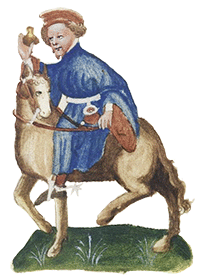|
|
|
|
 |
to Chaucer's Manciple |



A gentil MAUNCIPLE was ther of a temple,
Of which achátours myghtė take exemple
For to be wise in byynge of vitaille;
For wheither that he payde or took by taille,
Algate he wayted so in his achaat
That he was ay biforn and in good staat.
Now is nat that of God a ful fair grace,
That swich a lewėd mannės wit shal pace
The wisdom of an heepe of lerned men?
Of maistrės hadde he mo than thriës ten,
That weren of lawe expert and curious,
Of whiche ther weren a duszeyne in that hous
Worthy to been stywardes of rente and lond
Of any lord that is in Engėlond,
To maken hym lyvė by his proprė good,
In honour dettelees, but if he were wood,
Or lyve as scarsly as hym list desire;
And able for to helpen al a shire
In any caas that myghtė falle or happe,
And yet this Manciple sette hir aller cappe.
|
570
575
580
585
|
[AJ Notes:]
567. maunciple...of a temple, a manciple was a buyer of provisions,
working under a cook or a steward. This manciple worked for a 'temple,'
i.e., one of the Inns of Court (Middle Temple or Inner Temple) for lawyers.
568. achátours, purchasors.
569. byynge of vitaille, buying of victuals.
570. payde or took by taille, paid cash or acquired on credit.
571. Algate, in any case, either way.
achaat, purchase.
572. was ay biforn, always came out ahead.
574. lewed, ignorant; unlearned.
pace, outpace.
581. by his propre good, on his actual income.
582. dettelees, debtless.
but if he were wood, except if he was mad.
583. scarsly, frugally.
584. al a shire , a whole shire.
586. sette hir aller cappe, was able to set all their caps askew (i.e., get the best of them).
Source:
Pollard, Alfred W., ed. Chaucer's Canterbury Tales. Vol I.
London: Macmillan and Co., Ltd., 1903. 20-21.
 | to Chaucer's Manciple
|

|
to the Canterbury Tales
|
 |
to the Works of Geoffrey Chaucer |
Copyright ©1996-2023 Anniina Jokinen. All Rights Reserved.
Created by Anniina Jokinen on February 5, 2023.
|
|
|